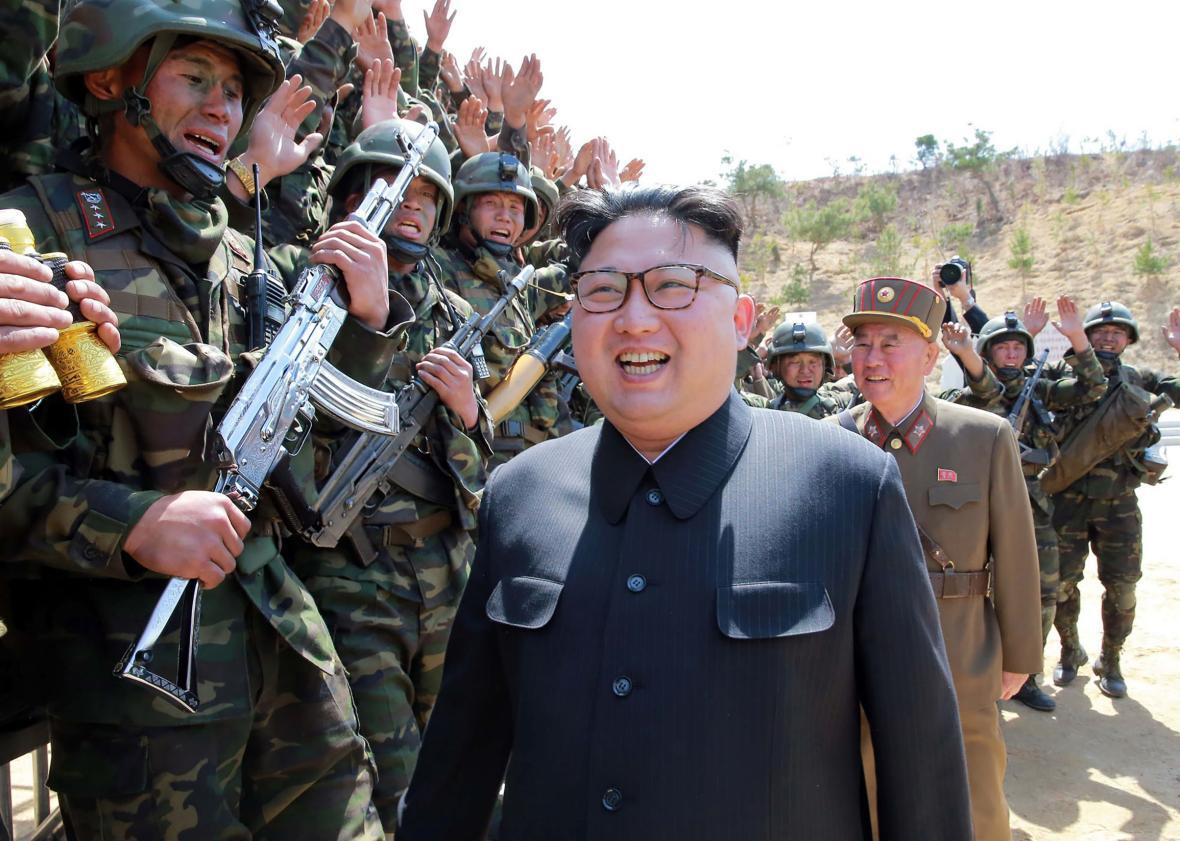Tensions are rising on the Korean peninsula this weekend with speculation mounting over whether North Korea is about to test a nuclear weapon and questions of what President Trump is preparing to do in response.
Saturday is a holiday in North Korea, the birthday of the country’s founder and the current leader’s grandfather, Kim Il-sung. North Korea has conducted nuclear and missile tests on important national holidays in the past—though not this particular one. On Friday, the country told foreign journalists visiting for the holiday to prepare for a “big and important event.” As Reuters notes, though, similar announcements have been busts in the past. Still, satellite images show signs that North Korea is preparing another nuclear test.
Meanwhile, a U.S. Navy strike group led by the aircraft carrier Carl Vinson is headed toward North Korea as a show of force. This sort of scenario—beefed up U.S. naval presence combined with a North Korean weapons test—has happened before, quite recently in fact. The difference now, of course, is that Trump is president and nobody really knows what his North Korea policy is (or what might be going on in his head).
NBC reported on Thursday that the U.S. was preparing to launch a pre-emptive strike against North Korea if the military was convinced the isolated state was about to conduct a nuclear weapons test. Using pre-emptive military force to counter a test would be a major shift in strategy. The NBC report suggested the strike could be a tomahawk missile barrage, the same weapon used against Bashar al-Assad’s air force in Syria last week, but it’s not quite clear what the target would be. A Trump administration official called the report “flat wrong.”
Trump has said that he wants China to do more to rein in North Korea’s nuclear program, but that the U.S. will act unilaterally if it does not:
In an interview with the Wall Street Journal this week, however, Trump also said that he had come to realize through conversations with President Xi Jinping that China’s leverage over North Korea is limited—something he maybe should have learned from briefings before such a conversation. China has taken some additional steps to put pressure on North Korea in recent days including turning back ships carrying North Korean coal—the country’s main export—and canceling Air China service to Pyongyang.
North Korea almost certainly doesn’t have the capability to attack the U.S. mainland, but if things escalate it could retaliate with an attack on U.S. forces stationed in South Korea or on South Korean civilian targets. The South Korean government and media appear remarkably blasé about the situation today, which is one possible indication that war is unlikely to start this week. (Or restart, technically. North Korea only signed a truce after the Korean War ended in 1953, not a peace treaty.)
An important detail in the NBC story is that “[i]mplementation of the preemptive U.S. plans, according to multiple U.S. officials, depends centrally on consent of the South Korean government.” South Korean politics are, to put it mildly, in flux right now, since the impeachment of President Park Geun-hye last month. Her likely replacements mostly favor a more conciliatory approach to North Korea and have been critical of the previous government’s decision to allow the U.S. to deploy a missile defense system in the country—a move that has enraged Beijing. Even if it doesn’t lead to all-out war, any U.S. move seen as recklessly endangering South Korea’s safety could push the country further toward Beijing’s orbit. Leading candidate Moon Jae-in said in a recent Facebook post, “The safety of South Korea is as important as that of the United States. There should never be a preemptive strike without South Korean consent.”
It’s also not clear that North Korea plans to make good on its threats this weekend. It seems likely that another test is coming at some point, but it’s hard to say for sure when that will happen. A senior North Korean official told the Associate Press it would be “[a]t a time and at a place where the headquarters deems necessary, it will take place.”
The North Korean media has been hyping a major new construction project in Pyongyang as a symbol of national strength equivalent to “100 nuclear bombs.” I don’t want to give the North Korean regime too much credit, but it would be quite a troll of Trump if the “big important event” they were boasting about turned out to be a real estate development.
Though sometimes viewed as just a “crazy, fat kid,” North Korean despot Kim Jong-un has generally behaved in a manner to ensure his own survival. Testing a nuke right at this moment seems like an awfully risky move, especially considering the unpredictable new leader in the White House.
That being said, recent events in Syria show how quickly these situations can escalate, and in the age of Trump, it’s hard to be certain that normal geopolitical rules will apply. Unlike in the case of Syria, though, the presence of nuclear weapons means the stakes are a lot higher.
